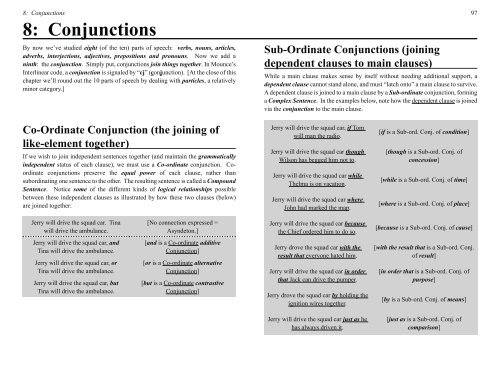Elementary New Testament Greek, 2014a
Elementary New Testament Greek, 2014a
Elementary New Testament Greek, 2014a
Create successful ePaper yourself
Turn your PDF publications into a flip-book with our unique Google optimized e-Paper software.
8: Conjunctions<br />
8: Conjunctions<br />
By now we’ve studied eight (of the ten) parts of speech: verbs, nouns, articles,<br />
adverbs, interjections, adjectives, prepositions and pronouns. Now we add a<br />
ninth: the conjunction. Simply put, conjunctions join things together. In Mounce’s<br />
Interlinear code, a conjunction is signaled by “cj” (conjunction). [At the close of this<br />
chapter we’ll round out the 10 parts of speech by dealing with particles, a relatively<br />
minor category.]<br />
Sub-Ordinate Conjunctions (joining<br />
dependent clauses to main clauses)<br />
While a main clause makes sense by itself without needing additional support, a<br />
dependent clause cannot stand alone, and must “latch onto” a main clause to survive.<br />
A dependent clause is joined to a main clause by a Sub-ordinate conjunction, forming<br />
a Complex Sentence. In the examples below, note how the dependent clause is joined<br />
via the conjunction to the main clause.<br />
97<br />
Co-Ordinate Conjunction (the joining of<br />
like-element together)<br />
If we wish to join independent sentences together (and maintain the grammatically<br />
independent status of each clause), we must use a Co-ordinate conjunction. Coordinate<br />
conjunctions preserve the equal power of each clause, rather than<br />
subordinating one sentence to the other. The resulting sentence is called a Compound<br />
Sentence. Notice some of the different kinds of logical relationships possible<br />
between these independent clauses as illustrated by how these two clauses (below)<br />
are joined together:<br />
Jerry will drive the squad car, if Tom<br />
will man the radio.<br />
Jerry will drive the squad car though<br />
Wilson has begged him not to.<br />
Jerry will drive the squad car while<br />
Thelma is on vacation.<br />
Jerry will drive the squad car where<br />
John had marked the map.<br />
[if is a Sub-ord. Conj. of condition]<br />
[though is a Sub-ord. Conj. of<br />
concession]<br />
[while is a Sub-ord. Conj. of time]<br />
[where is a Sub-ord. Conj. of place]<br />
Jerry will drive the squad car. Tina<br />
will drive the ambulance.<br />
[No connection expressed =<br />
Asyndeton.]<br />
Jerry will drive the squad car because<br />
the Chief ordered him to do so.<br />
[because is a Sub-ord. Conj. of cause]<br />
Jerry will drive the squad car, and<br />
Tina will drive the ambulance.<br />
Jerry will drive the squad car, or<br />
Tina will drive the ambulance.<br />
Jerry will drive the squad car, but<br />
Tina will drive the ambulance.<br />
[and is a Co-ordinate additive<br />
Conjunction]<br />
[or is a Co-ordinate alternative<br />
Conjunction]<br />
[but is a Co-ordinate contrastive<br />
Conjunction]<br />
Jerry drove the squad car with the<br />
result that everyone hated him.<br />
Jerry will drive the squad car in order<br />
that Jack can drive the pumper.<br />
Jerry drove the squad car by holding the<br />
ignition wires together.<br />
[with the result that is a Sub-ord. Conj.<br />
of result]<br />
[in order that is a Sub-ord. Conj. of<br />
purpose]<br />
[by is a Sub-ord. Conj. of means]<br />
Jerry will drive the squad car just as he<br />
has always driven it.<br />
[just as is a Sub-ord. Conj. of<br />
comparison]


















